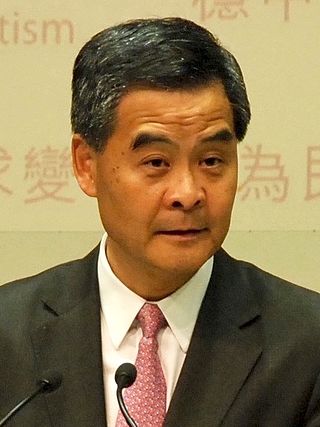
The Standing Committee of the National People's Congress (NPCSC) is the permanent body of the National People's Congress (NPC), the national legislature of the People's Republic of China. It exercises the powers of the NPC when it is not in session.

The Democratic Alliance for the Betterment and Progress of Hong Kong (DAB) is a pro-Beijing political party registered since 1992 in Hong Kong. Chaired by Gary Chan and holding 13 Legislative Council seats, it is currently the largest party in the legislature and in terms of membership, far ahead of other parties. It has been a key supporting force to the SAR administration and the central government's policies on Hong Kong.

Rita Fan Hsu Lai-tai is a senior Hong Kong politician. She was the first President of the Hong Kong SAR Legislative Council from 1998 to 2008 and a member of the Standing Committee of the National People's Congress (NPCSC).

Starry Lee Wai-king, SBS, JP is a Hong Kong politician and former chairperson of the largest pro-establishment Beijing-loyalist party, the Democratic Alliance for the Betterment and Progress of Hong Kong (DAB). She is a member of the Standing Committee of the National People's Congress (NPCSC), Legislative Councillor for the Kowloon Central geographical constituency, and a former Kowloon City District Councillor. From 2012 to 2016, she was a member of the Executive Council.

Ip Kwok-him, GBM, GBS, JP is a former unofficial member of the Executive Council of Hong Kong, served between 2016 and 2022. He is also former member of the Legislative Council of Hong Kong for the District Council (First) functional constituency and Hong Kong delegate to the National People's Congress and the former convenor of the caucus of the Democratic Alliance for the Betterment and Progress of Hong Kong (DAB) in the Legislative Council. He was awarded the Grand Bauhinia Medal (GBM) by the Hong Kong SAR Government in 2017.

The 2012 Hong Kong Chief Executive election was held on 25 March, 2012 to select the Chief Executive of Hong Kong (CE), the highest office in the Hong Kong Special Administrative Region (HKSAR), by a 1,193-member Election Committee (EC) to replace the incumbent Chief Executive. Won by the former non-official convener of the Executive Council of Hong Kong Leung Chun-ying, the election was the most competitive as it was the first election with more than one pro-Beijing candidate since the 1996 election.

People Power (PP) is a populist and radical democratic political party in Hong Kong. Formerly chaired by Raymond Chan, it belongs to the radical wing of the pro-democracy camp.
The Progressive Hong Kong Society was a political group in Hong Kong. It was established on 14 February 1985 by the then Executive and Legislative Council member Maria Tam. The party is considered conservative and pro-Beijing, in contrast to the pro-democracy forces which rose to prominence in the late 1980s and early 90s.

The Fifth Legislative Council of Hong Kong was the fifth meeting of the legislative branch of the Hong Kong Special Administrative Region Government. The membership of the LegCo is based on the 2012 election. The term of the session is from 1 October 2012 to 30 September 2016, during the term in office of the Chief Executive Leung Chun-ying. Due to the new arrangements agreed in a contentious LegCo vote in 2010, the session consists of the new total of 70 seats in LegCo, ten more than previously, with 35 members elected in geographical constituencies through direct elections, and 35 members in functional constituencies, in which five District Council (Second) functional constituency seats each represent all 18 District councils of Hong Kong voted for by all resident voters in Hong Kong. The Democratic Alliance for the Betterment and Progress of Hong Kong remained the largest party while the pan-democrats secured the one-third crucial minority. Notable new members of the LegCo members include Gary Fan from the new established party Neo Democrats and first openly gay councillor, People Power's Ray Chan Chi-chuen.

The Business and Professionals Alliance for Hong Kong (BPA) is a pro-Beijing, pro-business political party in Hong Kong. Chaired by Lo Wai-kwok, the party is currently the second-largest party in the Legislative Council of Hong Kong, holding eight seats. It also has two representatives in the Executive Council and five seats in the District Councils.

The 2017 Hong Kong Chief Executive election was held on 26 March 2017 for the 5th term of the Chief Executive of Hong Kong (CE), the highest office of the Hong Kong Special Administrative Region (HKSAR). Former Chief Secretary for Administration Carrie Lam beat former Financial Secretary John Tsang and retired judge Woo Kwok-hing, receiving 777 votes from the 1,194-member Election Committee.
The election for the Hong Kong deputies to the 12th National People's Congress (NPC) was held on 19 December 2012. 36 Hong Kong deputies were elected by an electoral college composed of 1,621 members.
The election for the Hong Kong deputies to the 11th National People's Congress (NPC) was held on 25 January 2008. 36 Hong Kong deputies were elected by an electoral college composed of 1,234 members.
The election for the Hong Kong deputies to the 10th National People's Congress (NPC) was held on 3 December 2002. 36 Hong Kong deputies were elected by an electoral college.

Holden Chow Ho-ding is a Hong Kong solicitor and politician. He is vice-chairman of the Democratic Alliance for the Betterment and Progress of Hong Kong (DAB), the largest pro-Beijing party in Hong Kong, and a former chairman of Young DAB, its youth wing. He was elected to the Legislative Council of Hong Kong in 2016, through the District Council (Second) "super seat". He was re-elected in 2021 through the New Territories North West geographical constituency.
The Hong Kong Legislative Council members' oath-taking controversy was a series of events surrounding the oaths of office of a dozen pro-democracy and localist camp members-elect of the Legislative Council of Hong Kong (LegCo) on 12 October 2016 which have resulted in the disqualification of six members, Sixtus "Baggio" Leung and Yau Wai-ching of Youngspiration, who were unseated by the court on 15 November 2016, and Leung Kwok-hung, Nathan Law, Yiu Chung-yim and Lau Siu-lai on 14 July 2017.
The election for the Hong Kong deputies to the 13th National People's Congress (NPC) was held on 19 December 2017. 36 Hong Kong deputies were elected by an electoral college composed of 1,989 members.

The 2021 Hong Kong electoral changes were initiated by the National People's Congress (NPC) on 11 March 2021 to "amend electoral rules and improve the electoral system" of the Hong Kong Special Administrative Region (HKSAR) for its Chief Executive (CE) and the Legislative Council (LegCo), in order to ensure a system in which only "patriots", according to the Chinese definition, govern Hong Kong. The reforms have been widely criticized for their negative impact on the democratic representation in the Hong Kong legislature.
The Hong Kong Special Administrative Region deputies to the National People's Congress, HKSAR members of the National Committee of the Chinese People's Political Consultative Conference and representatives of relevant national organisations functional constituency, also known as HKSAR members of NPC and CPPCC, representatives of national organisations functional constituency, is a functional constituency in the elections for the Legislative Council of Hong Kong first created in 2021. The constituency is composed of Hong Kong deputies to the National People's Congress (NPC), members of the National Committee of the Chinese People's Political Consultative Conference (CPPCC), delegates of the All-China Women's Federation, executive members of the All-China Federation of Industry and Commerce, committee members of the All-China Federation of Returned Overseas Chinese, committee members of the All-China Youth Federation, and directors of the China Overseas Friendship Association.












